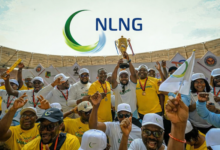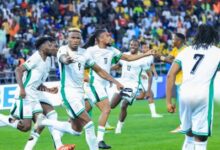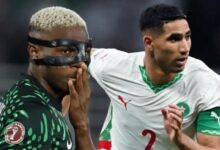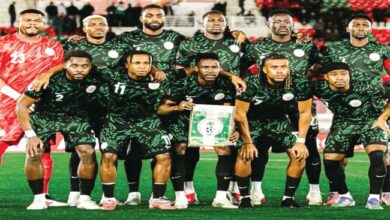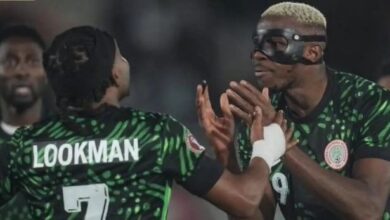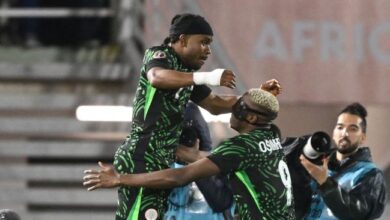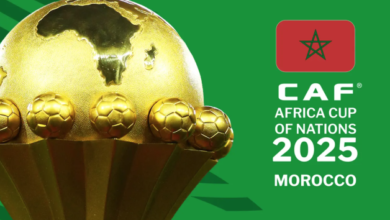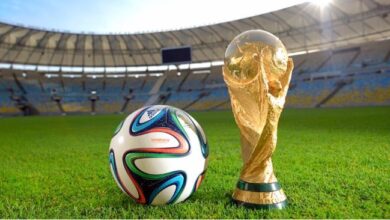Where Nigeria’s Super Eagles Got It Wrong Against DR Congo, World Cup Race

Nigeria’s road to the 2026 FIFA World Cup ended in heartbreak on Sunday night as the Super Eagles suffered a dramatic penalty shootout defeat to the Democratic Republic of Congo (DR Congo), crashing out of the CAF play-off final despite a star-studded squad that delivered a less-than-inspiring performance.
In a tense, emotionally draining encounter in Rabat, Morocco, the Super Eagles were held to a 1–1 draw in regulation time before losing 3–4 on penalties, extending Nigeria’s growing frustrations on the global stage.
This defeat marks a painful milestone in Nigerian football history — the first time the nation will miss two consecutive FIFA World Cups since making its debut in 1994.
A Bright Start That Faded Too Quickly
Nigeria began the match with intensity and purpose. Brentford midfielder Frank Onyeka fired the Eagles ahead in the 3rd minute with a crisp finish that seemed to settle nerves and signal dominance.
But the early momentum evaporated.
DR Congo fought back aggressively and were rewarded in the 32nd minute when Mechak Elia capitalised on defensive hesitation to slot home the equaliser, restoring parity and injecting fresh tension into a tight contest.
Missed Chances, Nervy Moments, Costly Decisions
Nigeria created chances — but failed to convert them.
- Tolu Arokodare’s powerful header went inches wide.
- Calvin Bassey spurned a clear opening.
- Moses Simon missed another glorious opportunity.
In contrast, the Congolese Leopards grew stronger, threatening repeatedly and forcing crucial saves from goalkeeper Stanley Nwabali, who delivered an outstanding performance throughout regulation time.
Shootout Drama: Nwabali’s Heroics Not Enough
During the penalty shootout, Nwabali saved two attempts, keeping Nigeria within touching distance.
But the Super Eagles faltered from the spot:
- Calvin Bassey missed.
- Moses Simon missed.
- Semi Ajayi missed.
DR Congo captain Chancel Mbemba buried the decisive kick, sealing a 4–3 shootout victory and sending the Leopards to the final intercontinental playoffs scheduled for March 2026.
Nigeria, once again, stumbled at the final hurdle.
Another World Cup Miss: What This Means for Nigeria
For a footballing giant with a deep pool of elite talent, this elimination raises vital questions about:
- tactical cohesion,
- mental resilience,
- squad leadership,
- and long-term football development.
The failure follows Nigeria’s 2022 World Cup miss against Ghana — and now extends a worrying trend of underachievement on the global stage.
For a country where football is a unifying force, the exit is more than a sporting disappointment; it is a national moment of introspection.
DR Congo March On; Nigeria Regroups Again
DR Congo’s victory sends them into the 2026 intercontinental playoff, keeping their World Cup dreams alive.
Nigeria, meanwhile, must begin another cycle of rebuilding, planning, and recalibration — with fans demanding accountability, stronger development structures, and a football identity that consistently delivers results on the world’s biggest stage.
Tactical Breakdown: Where Nigeria’s Super Eagles Got It Wrong Against DR Congo
Nigeria’s World Cup heartbreak in Rabat was not just the outcome of a penalty shootout — it was the product of tactical imbalances, structural weaknesses, and poor game management that continued to haunt the Super Eagles throughout the match.
BRANDECONOMY breaks down the key tactical faults that cost Nigeria a 2026 World Cup ticket.
1. Poor Defensive Organisation & Misaligned Backline
From the opening whistle, Nigeria showed structural fragility at the back.
The backline — Bassey, Ajayi, Osayi-Samuel, and Sanusi — operated on different wavelengths, often leaving gaps between centre-backs and full-backs.
Key issues:
- Poor communication, especially during transitions.
- Ball-watching instead of tracking movement.
- DR Congo exploited the half-spaces repeatedly.
- Mechak Elia’s equaliser highlighted Nigeria’s struggle to clear second balls.
The defensive shape lacked compactness — a problem that has persisted through multiple Super Eagles cycles.
2. Midfield Imbalance: No Connector, No Control
Nigeria’s midfield trio of Onyeka, Ndidi, and Iwobi struggled to provide cohesion.
Core tactical flaws:
- No natural ball progressor.
Iwobi drifted wide too often, leaving a gap between midfield and attack. - Ndidi played too deep, acting almost as a third centre-back.
- Onyeka provided energy, but not structure — meaning possession recycling broke down repeatedly.
The result was a midfield that could press, run, and tackle — but not dictate or build play.
This ceded control to DR Congo, especially after the 20-minute mark.
3. Lack of Tactical Identity in Attack
Nigeria created chances — but not through structure.
They relied on:
- individual brilliance,
- long balls to Arokodare,
- and counterattacks from wide areas.
The tactical problem?
Nigeria had no defined attacking pattern.
- Osimhen (injured/unavailable) absence was felt, as no forward made consistent diagonal runs.
- Arokodare was isolated and constantly contested aerial duels with little support.
- Moses Simon and Chidera Ejuke played on different wavelengths, taking turns to dribble without combination play.
Nigeria needed a triangle-based structure, not individual bursts.
4. Poor Game Management After Scoring Early
After Onyeka scored in the 3rd minute, Nigeria retreated instead of pushing for control.
Key management errors:
- The team dropped deeper instead of imposing possession.
- Congolese midfielders grew into the game unchallenged.
- Nigeria ceded initiative, momentum, and psychological control.
This reactive approach allowed DR Congo to grow in confidence and force an equaliser.
5. Sloppy Final Passes and Poor Decision-Making in Key Moments
Nigeria had at least three match-winning chances:
- Arokodare’s free header
- Bassey’s chance inside the box
- Moses Simon’s late curling effort
But the decision-making lacked calm, precision, and timing.
A team chasing a World Cup ticket cannot afford such wastefulness.
6. Penalty Tactics: Poor Selection, Poor Psychology
Penalty shootouts are not luck — they’re strategy.
Errors evident:
- Wrong taker order.
Bassey and Ajayi — both defenders — took high-pressure kicks. - No sports psychologist or kicking coach evident.
Modern football demands specialised preparation. - Body language and run-up techniques were poor.
Most misses came from rushed, telegraphed strikes.
Nwabali did enough to win the shootout.
The takers did not.
7. Coaching Decisions Lacked Adaptation
Coach Eric Chelle needs praise for leading Nigeria to the playoffs — but in this final, tactical adaptability was lacking.
The mistakes:
- No early substitution when the midfield lost control.
- Failure to introduce a creative midfielder (e.g., Alhassan Yusuf) when the game demanded composure.
- Wide players were not rotated, allowing DR Congo to predict transitions.
- Extra-time substitutions were reactionary, not strategic.
Nigeria simply didn’t adapt to the changing rhythm of the match.
THE BIGGER PICTURE: Nigeria’s Football Needs an Identity Reset
Nigeria’s elimination wasn’t a one-match issue — it reflects deep structural problems:
Systemic flaws include:
- Lack of a defined football philosophy
- Poor youth development transition
- Over-reliance on individual brilliance
- Inconsistent coaching structures
- Reactive match strategies
- Leadership and accountability gaps
Nigeria has talent — world-class talent — but no tactical identity.
Until that changes, the Super Eagles will always be vulnerable in decisive fixtures.
BRANDECONOMY VERDICT
Nigeria’s exit from the 2026 World Cup qualifiers was not due to lack of talent — it was due to lack of tactical coherence.
A modern national team must:
- impose its style,
- control midfield tempo,
- defend as a unit,
- execute set-pieces,
- and manage psychological moments.
Nigeria failed in too many of these departments.The Super Eagles must undergo a complete football reboot if they are to return to global relevance.


